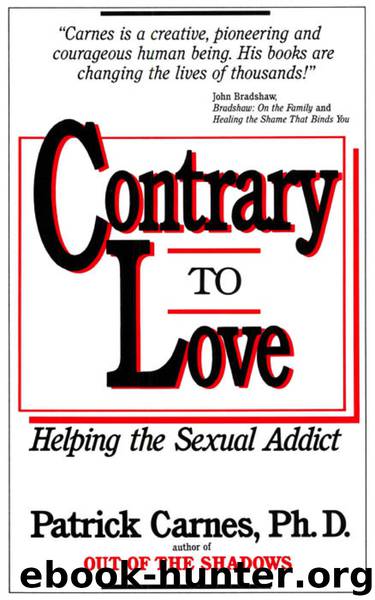Contrary to Love by Patrick Carnes

Author:Patrick Carnes
Language: eng
Format: epub
Publisher: Hazelden
Not all co-addicts experience these phases. Some will start with one set of extreme behaviors and simply intensify them as the addiction grows. Recovery for all co-addicts requires reflection on the changes in intensity or direction of their extreme behavior, and the recognition that these efforts were useless to prevent the sexually compulsive behavior.
Common Errors in Co-addicts' Thinking
Although extremes differ, co-addicts are prone to make three mistakes. First, they mistake intensity for intimacy. Life in the addict's family is seldom boring. Crisis, unmanageability, struggle, and pain become a steady emotional diet. Ironically, the disengaged are often the most intense, for it takes a great deal of energy to maintain the obsession from a distance. Because the emotions are so immediate, intensity feels like intimacy—but there is no closeness. Co-addiction fills up a person's life, but leaves needs unmet.
Angry tirades get the adrenaline running and in the short term feel good. At least something is happening. But co-addicts invariably are out of touch with their own feelings. They don't share their own sadness, fear of failure, pain, and loneliness. To share personal feelings would be an invitation to intimacy, too great a risk for the co-addict. So the siege continues. Ironically, the addicts never hear the one message that might help break through the denial about the impact of the addiction: that they are loved.
As time goes on, the co-addict vacillates being understanding one moment, enraged the next. Both these responses fail, which leads the co-addict to believe that he or she hasn't pushed hard enough. So, the co-addict stays in a vicious cycle of rage, understanding, sexual intimacy with the addict, and rage again.
Second, co-addicts mistake obsession for love or care. Like care, obsession focuses on another person, but makes that person into an object. Obsession stems from the terror of being left alone, while care trusts in another person's ongoing availability. Obsession fosters manipulation, whereas care creates respect for self and others. Obsession with another person obliterates self-awareness, while care assumes that fidelity to anyone else begins with faithfulness to oneself.
At its worst, obsession takes over the life of the co-addict. Like the addict, co-addicts lose a sense of their own lives. Pain, boredom, and lack of direction disappear as obsession gives new meaning and even excitement to life. Many co-addicts talk of how they've changed; they don't like the person they've become. Frequently, phrases like “losing myself” are used by co-addicts to describe a personality shift that almost parallels the Jekyll-Hyde experience of the addict. But obsession does have payoffs. One payoff is that obsession guarantees a connection with the addict—even when the addict isn't there. Obsession helps prevent feelings of abandonment. For example, Herb's obsession with Emily for years after he had left her was a way to keep her present in his life. His preoccupation helped stave off the grief of losing her to the addiction.
Another payoff of obsession is that co-addicts do not have to make choices for themselves or deal with their own issues and pain.
Download
This site does not store any files on its server. We only index and link to content provided by other sites. Please contact the content providers to delete copyright contents if any and email us, we'll remove relevant links or contents immediately.
Rewire Your Anxious Brain by Catherine M. Pittman(17639)
Talking to Strangers by Malcolm Gladwell(11991)
The Art of Thinking Clearly by Rolf Dobelli(8928)
Mindhunter: Inside the FBI's Elite Serial Crime Unit by John E. Douglas & Mark Olshaker(7898)
Becoming Supernatural by Dr. Joe Dispenza(7160)
Change Your Questions, Change Your Life by Marilee Adams(6704)
The Road Less Traveled by M. Scott Peck(6687)
Nudge - Improving Decisions about Health, Wealth, and Happiness by Thaler Sunstein(6685)
The Lost Art of Listening by Michael P. Nichols(6534)
Enlightenment Now: The Case for Reason, Science, Humanism, and Progress by Steven Pinker(6449)
Win Bigly by Scott Adams(6359)
Mastermind: How to Think Like Sherlock Holmes by Maria Konnikova(6297)
The Way of Zen by Alan W. Watts(5845)
Daring Greatly by Brene Brown(5697)
Big Magic: Creative Living Beyond Fear by Elizabeth Gilbert(4783)
Grit by Angela Duckworth(4780)
Men In Love by Nancy Friday(4384)
Flow by Mihaly Csikszentmihalyi(4096)
The Four Tendencies by Gretchen Rubin(4061)
